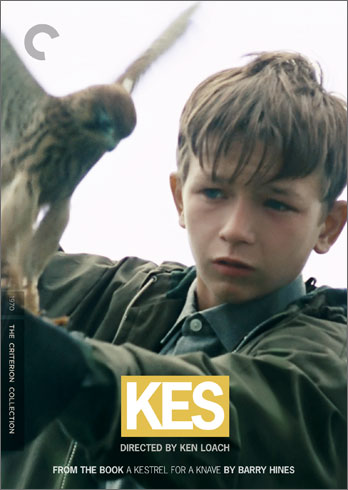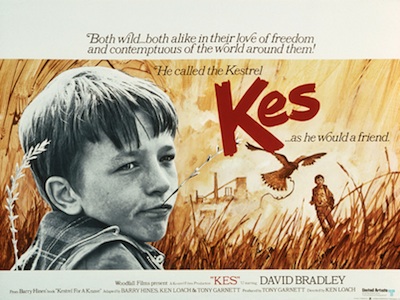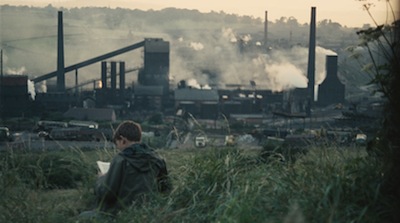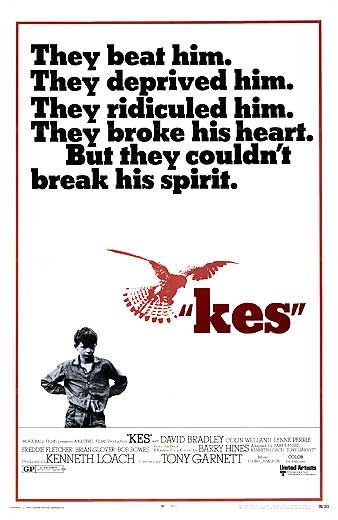
Neorealist cinema first became a thing in post-War Italy, when socially conscious artists picked up movie cameras to make films that accurately reflected their experience. The goal was to shoot simply and with non-professional actors and to tell common stories that weren't necessarily conventional stories, at least not in terms of how fictional films were usually categorized. Ever since, "Neorealism" has been the go-to descriptive for any movie that attempts to mimic the rhythms of the everyday, to tell tales of regular people contending with their very real environments.
For as much as the tag can be applied with cavalier frequency, including by myself, I can't think of a film that deserves to sit alongside the original Italian masters more than Kes. The simple, yet affecting, second film by English writer/director Ken Loach is affectless in its careful portrayal of one working-class boy's struggles to find a small sliver of happiness and belonging in a gray, overcast existence. Released in 1970, and adapted from a book by Barry Hines (who also contributed to the screenplay), Kes sheds the spotlight on Billy (David Bradley), a fifteen-year-old struggling to make his way in the world.
Billy lives with his mother (Lynne Perrie) and an older brother named Jud (Freddie Fletcher). His father has long since taken off, and so Billy is left to fend for himself. Mother has many boyfriends and likes to go out to the pub; Jud works in the mines and gambles on horses and is generally a prick. (His name out loud sounds like "Jude," and we are likely supposed to think of Judas the betrayer.) Billy doesn't really fit in at school, though it's hard to tell how much he removes himself purposely. His sadistic soccer coach, for instance, doesn't believe that Billy can't afford gym clothes; he thinks the boy plays the poverty card in order to get out of participating. (The game that follows is embarrassing, with the preening teacher living out some delusional glory by besting his juniors; the locker room shower scene that follows that is uncomfortable and sad.) Likewise, the news agent that Billy delivers papers for is right to treat the boy as a thief. Even if he doesn't steal from the store, he is out there nicking things when it's convenient.
One of the items Billy steals is a book on falconry. He does so after he finds a kestrel nest on a neighboring farm. He reads up on how to take care of and train a bird, and then he catches one of the hatchlings. Over the coming weeks, Billy sticks to the new task like he's never stuck to anything, training the kestrel--whom he has nicknamed Kes--to trust him and return to his arm even when allowed to fly free. Pretty soon, Billy is able to confidently speak on the subject of falconry, catching the attention of his teacher (Colin Welland), who is impressed with the boy's initiative. As a viewer, I kept yearning for the teacher to say something to Billy about getting a job working with animals. Billy is about to leave school and join the workforce. There is even an awkward interview with a guidance counselor (Bernard Atha) where Billy never once mentions Kes. In our minds, this is his way out of Northern England and the poverty that is all around him; I suppose for Billy, though, it's his private happiness, and its specialness must be guarded as closely as the bird itself. The boy respects that which can't be tamed.
David Bradley makes an impressive debut as Billy. From a talent standpoint, Loach finding him is no less auspicious than Francois Truffaut drafting Jean-Pierre Léaud for The 400 Blows. Bradley gives a performance that is completely free of self-consciousness or clichéd actorly mannerisms. He is completely comfortable onscreen, and even when charged with doing nothing, there is an inner life evident in the boy's eyes. To misjudge and assume that there is nothing more there than immediately evident is to be no better than the people all around Billy who think he will never amount to anything. Sure, they may be proven right, they may get him to actually believe it, but let's cross our fingers that the cruel ending of Kes is enough to stoke the fires within the teen, to give him the push he needs to get out of this dead end.

Ken Loach films Kes from an observational standpoint. The camera is not intrusive, he mainly hangs back and stays out of the way. If the action gets confusing, he lets it stay that way. In life, fights don't get edited so we can see the blows being traded. This allows for a more sympathetic picture to emerge from the everyday chaos. The director even gives time to the other members of Billy's family, including a telling night out on the town. While Billy stays home and studies his new hobby, his mother and brother engage in a bizarre ritual, competing for attention amongst the other drinkers. It borders on flirtation, really. As the older woman insists she can't trust a man again, Jud's interruptions make you wonder if he'd rather be the only object of her affection. This makes sense when we see how he resents her for doting on Billy.
Kes is, at times, rather bleak, and it definitely doesn't flinch from the harsh realities of Billy's childhood. I have to wonder if this is why we don't regularly see Kes associated with other coming-of-age films aimed at younger viewers. I could see this as a double-feature with White Mane [review], for instance. Stories about young boys and their special animals were a favorite of mine growing up, and I certainly would have enjoyed Kes. Most kids have a pretty solid grasp on mortality, and the heavier themes here shouldn't be that hard for early adolescents and even older elementary-aged children to process. Maybe now that it's out on DVD and Blu-Ray, it will have the opportunity to be discovered by a whole new generation. I certainly hope so. If nothing else, it's a new discovery for me!

The Kes - Criterion Collection Blu-Ray comes with many bonus features, though the most fascinating to Loach fans may be the 1966 television feature Cathy Come Home, an early endeavor of the director's (running time: 77 minutes). Cathy Come Home tells the story of the downward slide of a young couple, from courtship to marriage to the troubles of starting a family. When the husband gets injured and several kids come along, finances grow thin. Homelessness and squatting are options, as are joining trailer park-type "caravans" and eventual government dormitories. Loach tells the story in a scattershot format, showing segments of time in quick, short scenes, moving forward quickly to show how fast things can get out of control. The grainy black-and-white and location shooting, and the pseudo-documentary style, complete with interviews from voices of authority, add to the political thrust of the film. Myths of the housing problem are busted, and tough topics challenged. It's maybe a little long, but such was the nature of the problem, it was a long tumble to the bottom that tore families apart and stacked the obstacles against those struggling. It also seems a little heavy handed today. Still, despite its faults and the fact that it's dated, Cathy Come Home is a fascinating, raw experiment all the same.

For a complete rundown on the special features, read the full review at DVDTalk.

1 comment:
Having watched Kes for the first time in decades last night, I concur with your perceptive review. I suspect current audiences may indeed find the film with its downbeat ending as decidedly bleak and unsuitable fare for kids. The nearly impenetrable Yorkshire accents also pose a potential issue for younger viewers who may have trouble keeping up with the essential subtitles. It's particularly satisfying to revisit this early effort in light of Loach's subsequent career. Though classism is clearly a theme, it seems more subdued here in deference to its wonderfully flawed yet sympathetic protagonist. David Bradley's performance is still a stunner 50 years later.
Post a Comment